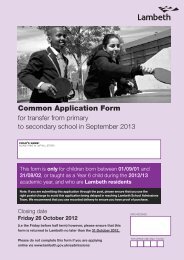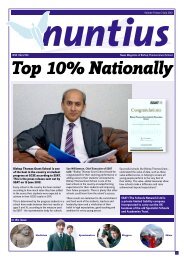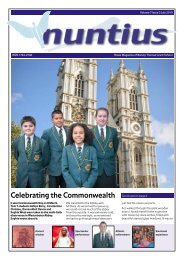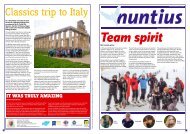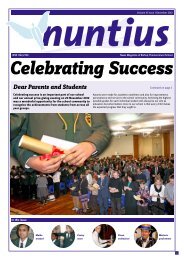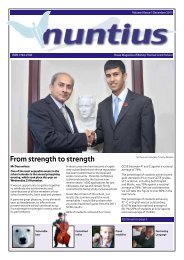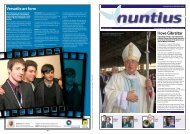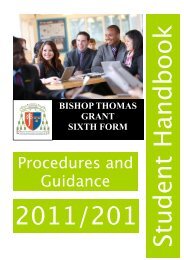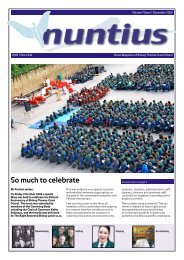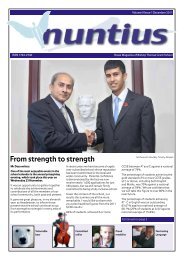PROSPECTUS - Bishop Thomas Grant School
PROSPECTUS - Bishop Thomas Grant School
PROSPECTUS - Bishop Thomas Grant School
Create successful ePaper yourself
Turn your PDF publications into a flip-book with our unique Google optimized e-Paper software.
BISHOP THOMAS GRANT SCHOOL BISHOP THOMAS GRANT SCHOOL BISHOP THOMAS GRANT SCHOOL BISHOP THOMAS GRANT SCHOOL BISHOP THOMAS GRANT SCHOOL<br />
Mathematics<br />
Mathematics is a core subject of the National<br />
Curriculum studied by all students for just over ten<br />
percent of the week. Students are taught in setted<br />
classes in order that they can proceed at a pace<br />
suitable for their mathematical aptitude. Progress is<br />
carefully monitored by continuous assessment and by<br />
students’ self-assessment. There is formal testing at<br />
half-termly intervals.<br />
Students follow structured schemes of work which<br />
develop their knowledge, skills and understanding<br />
in the following areas: Numbers and Algebra,<br />
Shape and Space, Handling Data and Using and<br />
Applying Mathematics.<br />
The schemes of work contain special materials which<br />
provide help for those experiencing difficulties, but<br />
which also contain extended work for the more able.<br />
All students are entered for the final exam according<br />
to their mathematical ability. Foundation (Grades C-G)<br />
or Higher (Grades A*-D).<br />
At Key Stage 4, the more able students will be fast<br />
tracked to take their GCSE or Statistics at the end<br />
of Year 10 and to embark on an Additional Maths<br />
course in year 11.<br />
Information and Communications<br />
Technology<br />
Students in Year 7 follow the new Key Stage 3 strategy<br />
recommended by the Department for Education and<br />
Skills which is mapped across in the online book they<br />
use called ICT 4 Life. This gives them a thorough<br />
grounding in the use of ICT. In Year 8, students<br />
prepare for the DiDA (Diploma in Digital Applications)<br />
which gives them the skills required to tackle the SPB<br />
(Summative Project Brief) which is assessed in Year<br />
9 using an online book called DiDA: Using ICT. This<br />
accelerated curriculum (starting DiDA in Year 9) allows<br />
students of all abilities to reach their full potential by<br />
the end of Year 11.<br />
DiDA is the new suite of qualifications run at the<br />
school. This allows students to gain one, two,<br />
three or four GCSE equivalents in various areas of<br />
ICT specialism such as Multimedia, Graphics and<br />
Enterprise. The assessment of the course is based<br />
completely on an SPB for each unit. Students complete<br />
an e-portfolio in response to the SPB which is<br />
published by the examination board.<br />
In year 10 we offer a wide selection of ICT courses<br />
tailored to suit the individual student. At the end of<br />
BISHOP THOMAS GRANT SCHOOL BISHOP THOMAS GRANT SCHOOL BISHOP THOMAS GRANT SCHOOL BISHOP THOMAS GRANT SCHOOL BISHOP THOMAS GRANT SCHOOL



